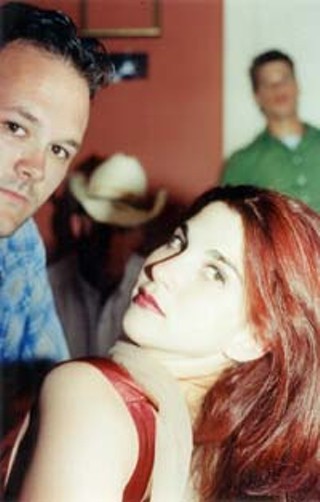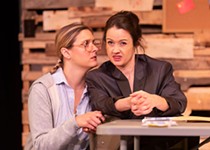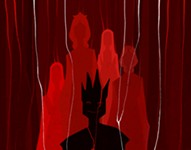Fool For Love/Cowboy Mouth: Nighttime Hollering and Thumps
Local Arts Reviews
Reviewed by Ada Calhoun, Fri., June 23, 2000

Fool For Love/ Cowboy Mouth:
Nighttime Hollering and ThumpsThe Hideout,
through July 1
Running time: 2 hrs, 30 min
"During the show, there will be gunshots, strobe lights, and smoking." If that playbill caveat doesn't bode well for a Sam Shepard double bill, I don't know what does. The nine-month-old dirigo group's follow-up to its excellent debut -- a reconsideration of Eugene O'Neill's Desire Under the Elms -- is a set of two scream-filled one-acts about all-consuming passion. Like desire, these works are loud and raw, full of the nighttime hollering and thumps you might hear emanating from your alcoholic neighbors' house and call the cops about. They are also -- and dirigo seems to be establishing a pattern here -- bleak-yet-elegant takes on star-crossed love.
Shepard wrote Fool for Love, the sad, motel-based play of incestuous lovers May and Eddie, in the early Eighties. Dirigo's version of this Lone Star-esque tale about the quintessential love-hate relationship is, as directed by Laura Somers, a fast-paced romp of screams and door slamming. As in desire, Somers adds new elements, in this case slide projections on one wall of rules from The Rules, hints like "Don't try to change him." This commentary stresses in a naggingly ironic fashion the contrast between "catch yer man" tactics and the emotional chaos taking place onstage. The slides and Somers' transformation of the Countess (Eddie's dangerous lover) into a three-sexy-cowgirl fantasy chorus both emphasize the omnipresent rift between fantasy and reality, rules and real life.
Judson L. Jones and Christa Kimlicko Jones, a real-life married couple, are well-cast and plenty watchable as they cower, bound up like coils, and then ricochet around the room in gut-wrenching panic. Eddie's macho desperation is palpable, as when he decides in the heat of the moment that it's high time he cleaned his gun, broke open the tequila, and practiced lassoing. May's frantic passion comes out in her repeated fervent attempts to make the bed. As the ghost of their father, Steve Zinkgraf nails the stoic cowboy swagger, and Greg Gondek is endearingly naïve as Martin, May's hapless would-be date.
Second on the docket, Cowboy Mouth was co-written with singer/poet Patti Smith (who is not given credit in the dirigo program) during Shepard's affair with her in the early Seventies. It takes place in a dingy, cluttered apartment, and the title comes from a line in Cavale's how-to-be-a-rock-star-savior speech: "People want a street angel. They want a saint, but with a cowboy mouth." Smith's voice is evident here as it is throughout the play, particularly in the idealistic-stoner speeches of Cavale, who walks around on a bandaged foot stroking and cooing to her beloved dead crow. The autobiographical elements are hard to miss, as Cavale tries to convince Slim to become a rock star while he wavers between staying in her fantasy world and returning to his wife and child.
Steeped in early Seventies innocence, Cowboy Mouth runs to the cute. While certain moments (such as the arrival of the spectacular Lobster Man) can't fail to amuse, Somers as Cavale and Chris Alonzo as Slim come off as more amused by themselves than we could possibly be. While true to the egoism to which rock & rollers are prone, there seems to be a whole lot of smirking going on. These characters are smug possessors of an archaic street poet groove, and, as directed by Corey Gagne, endlessly pose the rhetorical question: Why walk by a box when you can kick it?
Still, in both offerings there is lyricism and plenty of dreaminess, helped in spades by Christopher Meister's lighting design, which includes a disco ball, Christmas lights on fade, and eventually a large moon projection. Down to the fringe on the unruly bedspread and the Elvis Presley house music, the details are golden. In fact, for all the little pretensions of Cowboy Mouth, it proffers the valuable lesson that freaks turn into rock stars and family men do not. In Shepard's happy case, family men instead go back to their wives (at least temporarily) and, in just 10 years' time, become much better playwrights.










